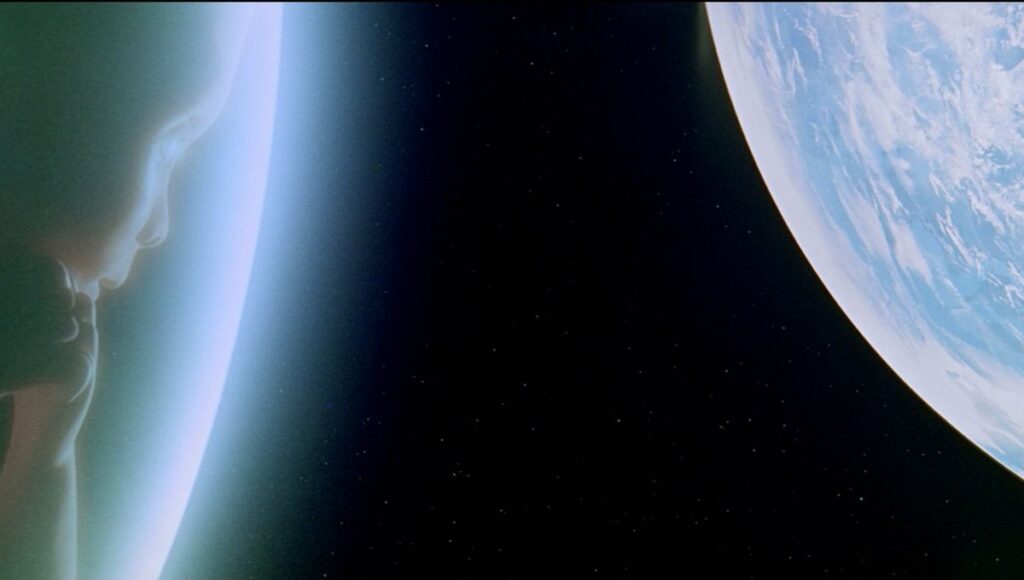
Back while I was in high school, 2001: A Space Odyssey came out. I went to see it and was blown away. Back home I tried to explain the film to my parents. My father quipped, “Sounds like a space oddity.”
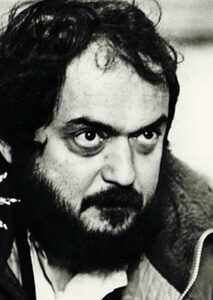 I told them I wanted to be a movie producer. My mother said, “Isn’t that the guy who raises the money for the movie?”
I told them I wanted to be a movie producer. My mother said, “Isn’t that the guy who raises the money for the movie?”
Well, I didn’t want to do that! So I blurted, “I want to be whatever Stanley Kubrick is,” unaware that Kubrick was a producer…and a director…and a co-screenwriter. I wasn’t well-versed back then on how the film industry worked.
I went out and bought a “making of” book about 2001 and devoured it, getting more and more hooked on the idea of making movies.
I discovered my high school had one single Film Making class. I enrolled and entered the world of making movies, using the highly advanced technology of regular 8mm black-and-white film with no soundtrack.
 As my project for the class, I made a documentary of Cambridge State Hospital half an hour north of my Minnesota home. It was an institution where mentally challenged individuals were permanently warehoused. Armed with a camera, rolls of 8mm film, a portable cassette recorder, and my best friend Tom Jones, I headed up there.
As my project for the class, I made a documentary of Cambridge State Hospital half an hour north of my Minnesota home. It was an institution where mentally challenged individuals were permanently warehoused. Armed with a camera, rolls of 8mm film, a portable cassette recorder, and my best friend Tom Jones, I headed up there.
We were escorted as we went from building to building documenting away with Tom acting as my sound guy operating the cassette recorder. When finished, I edited the film by cutting and gluing the edges together of physical film. All I can say now is, thank God for digital cameras and computer software editing!
I titled it “A Look a Cambridge State Hospital.”
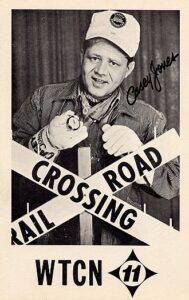 In the Twin Cities television market we had an independent channel, WTCN channel 11. Saturday afternoons that channel broadcast a half hour show of local people that had done something interesting in the recent past.
In the Twin Cities television market we had an independent channel, WTCN channel 11. Saturday afternoons that channel broadcast a half hour show of local people that had done something interesting in the recent past.
At the end of the semester, our instructor arranged to have that show air four of our student films. Mine was chosen as one of them. Afterward my instructor privately told me that, while the first three films were screened, the crew at the station didn’t pay a lot of attention to them, but when mine was screened, they became quiet and somberly focused on it. My film was a smash hit!
 After graduation I headed off to BYU for college in Provo, Utah. As so many other freshmen before me, I arrived on campus not knowing what I wanted to major in. I grabbed a catalog and thumbed through the pages of possible majors. I came to a screeching halt when I encountered “Theater and Cinematic Arts.”
After graduation I headed off to BYU for college in Provo, Utah. As so many other freshmen before me, I arrived on campus not knowing what I wanted to major in. I grabbed a catalog and thumbed through the pages of possible majors. I came to a screeching halt when I encountered “Theater and Cinematic Arts.”
I stared at it and cried in my head, “That’s what I want to major in!” Then promptly told myself, “Don’t be ridiculous, Martindale. You can’t make a career out of making movies.”
You see, voices in my head from the past wouldn’t have it. I needed to major in something practical, not pie-in-the-sky creative stuff. In particular, I remembered my father once saying, since I loved to write stories, “Being an author is a starvation career, unless you get really really lucky and make it big.”
So I did nothing toward the thing I wanted to do most—make movies. Until about a decade later (one failed marriage later) I made another movie while attending a young adults Mormon congregation for college students. I was not a college student at the time, but I was a young adult, so there it is. It’s also where I romanced wife #2.
For an activity the congregation decided to break up into groups and each make a short film, then have a spoof award show and give out joke trophies. Since I’d made a movie before, my group nominated me to direct it. I also came up with the story.
 We made a film about a guy on the toilet, having done his business, reaching for the toilet paper. Sadly the roll was loosely attached to the wall and fell off. It escaped out the door and down the stairs of an upstairs apartment, unrolling and leaving an ever-growing trail behind it.
We made a film about a guy on the toilet, having done his business, reaching for the toilet paper. Sadly the roll was loosely attached to the wall and fell off. It escaped out the door and down the stairs of an upstairs apartment, unrolling and leaving an ever-growing trail behind it.
The guy, pants pulled up but unbuttoned so that he had to hold them as he ran, chased after it out the door. Thus began the toilet paper’s great adventure rolling around the neighborhood, down sidewalks, through parks, up and down a playground slide—that sort of thing. All the while being chased by the poor guy.
 At one point the roll crossed a street as Future Wife #2 drove up in her little orange Dodge Dart. She made an emergency stop and looked out the window as the TP rolled by. As she drove away we see a sticker on her back bumper reading, “I brake for toilet paper.”
At one point the roll crossed a street as Future Wife #2 drove up in her little orange Dodge Dart. She made an emergency stop and looked out the window as the TP rolled by. As she drove away we see a sticker on her back bumper reading, “I brake for toilet paper.”
We had a Polish exchange student in our group. We had her sitting on some stairs to the door of a building as the toilet paper rolled by, then the guy ran by. With a roll of her eyes and a smirk on her face, she mouthed, “Americans!” An inside joke that only the members of our congregation would get since no one else would know she was Polish.
 My idea was to end it with the paper unrolling all the way off, leaving a cardboard cylinder. The poor fellow would pick it up in frustration, toss it aside, and walk away.
My idea was to end it with the paper unrolling all the way off, leaving a cardboard cylinder. The poor fellow would pick it up in frustration, toss it aside, and walk away.
But fortune smiled upon us. While the paper rolled through the park, a dog dashed up, grabbed the roll in his mouth, and ran off. We all cried out and ran after him. The dog fled for a moment, but being surrounded, dropped the roll to the ground and ran off.
 And I, being savvy enough as a filmmaker by then, immediately knew how to take advantage of this. The dog would be featured in the movie, and the new ending would be the poor guy picking up the roll, examining how disgusting it was with dog teeth depressions, dog saliva, and bits of filth and mud on the paper, toss it aside in disgust, and walk away.
And I, being savvy enough as a filmmaker by then, immediately knew how to take advantage of this. The dog would be featured in the movie, and the new ending would be the poor guy picking up the roll, examining how disgusting it was with dog teeth depressions, dog saliva, and bits of filth and mud on the paper, toss it aside in disgust, and walk away.
We called the movie “Paper Chase.” I added a music soundtrack, and we were off to the spoof awards show.
 Now in every such little community there are those who are the popular inner circle. You know the type. They all joined together in their own group. They didn’t make a movie. They just ran the camera as they goofed around in some half-assed impromptu attempt to film a story on the fly. After the awards were given out, their film was shown again because, you know, they’re the popular guys and aren’t they so funny?
Now in every such little community there are those who are the popular inner circle. You know the type. They all joined together in their own group. They didn’t make a movie. They just ran the camera as they goofed around in some half-assed impromptu attempt to film a story on the fly. After the awards were given out, their film was shown again because, you know, they’re the popular guys and aren’t they so funny?
But I in my heart knew our group was the only one that submitted a real movie telling a real story, and my group concurred. Future Wife #2 even ripped the joke label off the trophy we got and slapped “Best Director” onto it for me.
Two decent little movies, and that was the end of my film career.
Wife #2 exits stage left. Wife #3 comes and goes. Kids grow up and leave the nest. I get involved with the last romantic relationship I’ve had with Almost Wife #4.
I start facing my midlife crisis. What am I doing with my life? I’ve not really had an official career so to speak, just two minor ones where I worked my way up to assistant manager in a bookstore chain for a while, plus spent a number of years as a computer operator at Salt Lake Community College and a life insurance company. I filled the cracks between those with various random jobs.
 Finally I thought, I should just go back to school and finish my Computer Science degree I had begun at BYU. I knew deep down I’d never developed a full career because my true passion was being creative telling stories through writing and making movies and that one time composing a musical. But those old bugaboo voices in my head kept plaguing me with, “Come on, get real! Those are pie-in-the-sky dreams.”
Finally I thought, I should just go back to school and finish my Computer Science degree I had begun at BYU. I knew deep down I’d never developed a full career because my true passion was being creative telling stories through writing and making movies and that one time composing a musical. But those old bugaboo voices in my head kept plaguing me with, “Come on, get real! Those are pie-in-the-sky dreams.”
As I contemplated these things, my sister looked me dead in the eye and said, “Why don’t you do what you want to do?” That hit me hard, and I looked at myself dead in the eye and said, “Why don’t I do what I want to do?”
 The very next day I headed down to Salt Lake Community College where I knew they had a film program and to the office of the head of the film department, Channing Lowe. He was available just then, and he could tell I was serious—and I was obviously mature—so he spent the next hour or more discussing their program and giving me a tour.
The very next day I headed down to Salt Lake Community College where I knew they had a film program and to the office of the head of the film department, Channing Lowe. He was available just then, and he could tell I was serious—and I was obviously mature—so he spent the next hour or more discussing their program and giving me a tour.
Community college, you might say? What kind of half-assed film program are they going to have?
 Well, actually, they have a whole-assed program there, and much more. Channing had built up a pretty impressive program with the resources available to him, and he had a good grasp on what he was doing. Because I was a mature student and he could tell I was serious, he gave me special treatment now and then, which I was very grateful for.
Well, actually, they have a whole-assed program there, and much more. Channing had built up a pretty impressive program with the resources available to him, and he had a good grasp on what he was doing. Because I was a mature student and he could tell I was serious, he gave me special treatment now and then, which I was very grateful for.
And besides, while I learned a lot of things about film production and gained significant experience, the most important part was, I could check out the school’s film equipment and make my own movies!
Just to illustrate how serious the film program at Salt Lake Community College was, the Utah legislature voted to fund the construction of an entire studio building complete with editing bays and other valuable resources for film and television production. Of course they did that at the tail end of my time there, and it was completed and available long after I was gone with my Associate degree. Boy, was I chapped about that!
The first film I made was over one weekend when I checked out a camera just to play with it and get used to it. I was visiting Almost Wife #4 and her daughter along with my son. Son and I sat on her sofa with a curio cabinet across from us against the far wall. It had a mirror in the back of it. As I looked at it and saw Son’s reflection in it, I said, “Hey, it looks like you’re inside the cabinet.”
DING! The idea hit in a flash. That weekend on the spot we filmed “Curio” starring daughter Laura, the first film I’d made since “Paper Chase.”
Laura loved making the film so much, come Christmas break she handed me a paper she’d written an idea on for another movie we could make, which of course she would star in. It would be maybe 15 minutes long.
I took a look at it, and my creative juices started flowing. “Laura, I think this could be a feature film.”
Christmas break ended , and I returned to school fired up for Production 2 class. But this time I was armed with a screenplay I had written—a feature length film developed from Laura’s idea called Geeks & Goblins, Elves & Elliot.
, and I returned to school fired up for Production 2 class. But this time I was armed with a screenplay I had written—a feature length film developed from Laura’s idea called Geeks & Goblins, Elves & Elliot.
One example of how Channing gave me special treatment was, after making three shorts of one, five, and seven minutes for the Production 1 class, Production 2 class required one 18 minute short. But I told Channing, “I’m sick of making shorts. I want to make a feature.”
Channing replied, “Well, we don’t allow students to make a feature film. But I suppose if anyone can do it, you can.” He looked at the screenplay and said, “135 pages! That’s awfully long!”
The rule of thumb in film production is roughly one minute of screen time for one page of screenplay. That would estimate my film to be 2 hours and 15 minutes long. Filmed in one semester. Dicey!
 I said, “I don’t think it’ll be that long. It’s pretty dialog heavy.” Dialog goes by faster on the screen rather than paragraphs of action descriptions.
I said, “I don’t think it’ll be that long. It’s pretty dialog heavy.” Dialog goes by faster on the screen rather than paragraphs of action descriptions.
He greenlit the project. I commenced auditioning and location scouting and recruiting a crew. Another example of Channing’s special treatment for me was, he had a policy of never appearing in a student’s film. But I wanted him to play the father of one of the two main families because I thought he looked the part, and he agreed.
I had one other sticky issue to deal with. Laura had starry eyes dreaming of plying the lead female part, but I felt strongly she was not right for it. I had to break that to her, but at the same time let her know I thought she’d be great for another prominent part. She was disappointed at first, of course, but took a closer look at that other part, and started feeling it. She decided herself it was a better part for her.
We began filming. A couple months went by. Disaster hit. I went in for quadruple bypass surgery with about a month of filming left to do, and a month of semester left to do it in. My cast and crew said, “Well, I guess that’s the end of that project.”
I said, “Not on your life!”
It took me a few weeks to recover, then we were back at it. Filming extended one month beyond what we originally planned, meaning one month past the end of the semester. Channing said, “I’m just going to give you an A for the class, because I know you’ll finish the film, and it’s obvious you’ve earned it.”
My cast and crew were absolute troopers accommodating the extended time. We all wanted to finish it. I’d list them all here in appreciation except you can see them in the credits of the movie.
Two of my main actors had a drop dead date when we had to finish because they were moving on to other projects. We barely wrapped shooting in time, just the week before.
I spent the summer editing and color correcting and laying down the sound track and all that. When I finished, I sent a message to Channing saying, “I finished editing. It came in at 89 minutes.”
He replied with, “Wow! I stand super corrected!”
 I left Salt Lake Community College with an Associate degree. After a while I headed down to Utah Valley University and cherry-picked my own program from multiple departments: Digital Media—Cinematography, Theater, Communications—and left there with a Bachelor degree.
I left Salt Lake Community College with an Associate degree. After a while I headed down to Utah Valley University and cherry-picked my own program from multiple departments: Digital Media—Cinematography, Theater, Communications—and left there with a Bachelor degree.
Meanwhile I joined with a husband/wife team who had a decent basic supply of production equipment and made some movies with them.
In all during this period, I made eight shorts, one feature film, and cut one trailer for the feature film.Then my health started failing. Film making can be physically taxing. By then I had officially retired and had Social Security and some retirement money coming in.
I decided to give up making movies and return to writing novels, my first dream in my youth before Stanley Kubrick wooed me to film. And with self-publishing being a option thing these days, I formed a publishing company named Worldsmith Stories LLC, and to date have published four of my books.
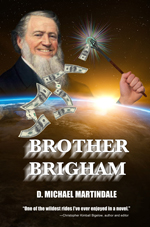


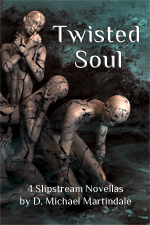
And life went on as if GPJS never existed.